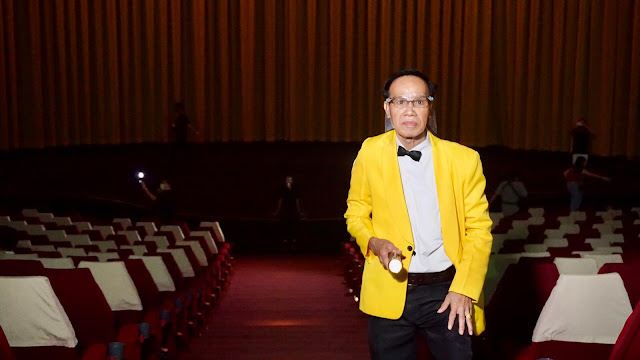Wearing face shields and holding flashlights, middle-age men in unique uniforms of yellow jackets and black bow ties eagerly led hundreds of moviegoers to their seats inside one of the oldest theatres in Thailand.
As its longtime ushers, it was probably one of their busiest days in years. Ironically, it was also their last day in duty.
Scala, Bangkok’s last standalone cinema founded over half a century ago, opened its doors to customers for the final time on July 5 after years of struggle to stay afloat in the media market rapidly changed by the digital revolution.
Although with the ongoing crisis of COVID-19 pandemic, thousands flocked in to bid a bittersweet farewell to their much beloved cinema over the weekend. The venue was packed both inside and outside all day through, an unusual sight for its normally empty hall.
Savouring the last moments, fans showed up to take photos and videos, with a few even dressed up in vintage costumes. They bought souvenirs, talked to the staff, or wrote messages on post-it notes and put them on a whiteboard.
After each round of the Sunday’s screening, Scala’s employees lined up in two rows at the exit to say thank you to all attendees until the very last one left the auditorium. Some teared up and hugged the staff. Some gave them roses and other small gifts.
The cinema’s last screening was Academy Award winning “Cinema Paradiso.” Owner Nanta Tansacha took to the stage afterward to thank the audience that could fill only about a half of the cinema’s 700-something seats due to a requirement to observe social distancing rules.
“Scala has brought everyone happiness for 51 years. Today, it’s time for us to go, but we’d like to go with happy memories,” she said, adding that the name “Scala” would then be given to an unnamed theatre in her family-owned botanical garden in Pattaya.
After ordering a nationwide business shutdown for over two months, the Thai government on June 1 allowed cinemas to operate again. While all big chained cineplexes instantaneously announced their comeback, it wasn’t the same case for Scala. Following weeks of rumours, the theatre, which would’ve celebrated its 51th anniversary in December, said it would close for good. It’s unclear what will happen to the building renowned for its elegant Art-Deco architecture.
The closure of one of the last remaining independent cinemas in the kingdom is a major blow to avid film lovers. Despite the state's caution over large crowd gatherings, people started queuing up to grab seats for Scala’s final screenings hours before the tickets went on sale on the first day. Shortly after, hundreds formed a long line that stretched to the outside of the building. All seats for its last event were sold out in just three days.


While the news was sudden, it didn’t come as a surprise. The oldie cinema, tucked in the heart of fast-growing Bangkok business district, had faced threats of shutting down for years due to financial pressure.
This harsh reality was evident in one of its last screenings “The Scala,” a 2016 Thai documentary about the theatre itself. Simple and straightforward, the film told the cinema’s story through accounts of four of its veteran employees, identified as The Caretaker, The Manager, The Technician and The Projectionist. While reminiscing about the good old days, it was clear they had already come to terms that their times were running out.
Compared to the bustling, modern surroundings, it looked almost as if the time inside Scala had stopped, with the marquee letters that need to be manually arranged, paper seat maps and handwritten tickets, or blackboards and chalks to take notes in the office. Throughout the film, the cinema struggled, both due to tight cash flow and being slow to adapt to changes.
The Caretaker washed the seat covers by hand at the theatre rooftop because the company couldn’t afford a laundry service. The Technician took extra duty fixing the cushions. The Projectionist had a hard time learning a digital display system, saying he could not wrap his head around new technology. Staff took on a massive task of cleaning the iconic grand chandelier, taking it down to be washed piece by piece before assembling it together all by themselves, regardless of their job titles.
Although with much adoration shown during its last days, the golden age of standalone cinemas was long over in Thailand. New media technology, from VCR to DVD to the boom of online streaming that allows people to watch movies anytime and anywhere, combining with dominating growth of commercial multiplexes, gradually pushed them out of the market.

While acknowledging they were becoming obsolete, the employees who’d stayed with the cinema since its early days put in their best efforts to run things in their old-school way.
In one of the film's final moments, The Technician, wanting to draw more people to Scala’s sibling Lido, led his team to install a new lighting display at the cinema’s light box that he designed by himself. After the work was done, he gazed at the flashy moving lights brightening up the front of the theatre from the opposite side of the street, looking happy and content.
Just two years after the documentary was released, their parent company Apex said goodbye to Lido. It was revamped into a multi-purpose entertainment hub by the new owner.
Seeing the documentary knowing their fates were already sealed was heavy-hearted. Scala, among the last of heritage from the cinema’s glory era in Thailand, offered a film experience with the old-age heart and spirit that could no longer be found anywhere else in the capital. Losing it is a great shame, but with the lack of support, all realised its end would come sooner or later.
“We have to admit that things have changed,” said Scala’s manager Puangthong Siriwan in the film. “Maybe it’s time for us to call it a day.”








